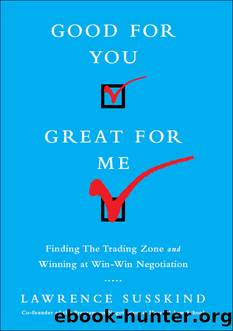Good for You, Great for Me_Finding the Trading Zone and Winning at Win-Win Negotiation by Lawrence Susskind

Author:Lawrence Susskind [Susskind, Lawrence]
Language: eng
Format: epub
Tags: Business & Economics, Negotiating, Conflict Resolution & Mediation, Organizational Behavior
ISBN: 9781610394260
Google: 6tPbAgAAQBAJ
Publisher: PublicAffairs
Published: 2014-06-03T14:47:08+00:00
Managing Group Interactions
WHEN MULTIPLE PARTIES GATHER to discuss a packed agenda, the process can descend into chaos or stalemate, making it difficult to find the trading zone or build a winning coalition. Itâs usually too much to expect that one of the parties will be able to manage the conversation in an even-handed way. If one party, however well intentioned, tries to assume the role of chair, others may view that as a power grab. And in multiparty negotiation, process opportunismâthe possibility that a manager or faction will wrest control of the agendaâis a constant worry.
Right from the start of multiparty talks, the parties may want to enlist a trained neutralâa professional facilitator or mediator. Some people think you bring in a mediator only after a dispute has erupted. But the fact is, a neutral party can guide participants into the trading zone much more effectively than they can find it on their own. (More on this in chapter 5.) Neutrals can be particularly helpful in the information-gathering stage. Through a process of joint fact-finding (as discussed in chapter 1), a mediator can help parties generate data and forecasts that everyone can use to build proposals or packages.
As the number of parties in a negotiation increases, group management becomes a bigger challenge. One factor is the phenomenon known as âgroupthink,â a term coined by psychologist Irving Janis. When people work together, sometimes their wish for unanimity overrides their commitment to weighing alternatives carefully. In their desire to please the group, participants are sometimes persuaded to accept solutions that are not in their own best interest. For this reason, negotiators in multiparty situations need to remain in close contact with their back tables. Otherwise, the pressure at the table to reach agreement may cause them to lose touch with the interests they are supposed to be representing.
When multiple parties are considering numerous issues at the same time, it often makes sense to break into smaller working groups. For example, when multiple companies or units are considering a possible merger, they might create separate working groups, populated by experts from all sides, to consider a range of technical issues. These subgroups contribute their findings to the larger conversation. That is, they donât have decision-making responsibility. Also, they must communicate their input in a way that is understandable to others who are not as well versed in specific technical issues as they are. But the packages that emerge, once the separate pieces have been put together, are more likely to be credible to all sides if they are prepared through appropriately structured working groups.
Download
This site does not store any files on its server. We only index and link to content provided by other sites. Please contact the content providers to delete copyright contents if any and email us, we'll remove relevant links or contents immediately.
| Conflict Resolution & Mediation | Human Resources & Personnel Management |
| Knowledge Capital | Outsourcing |
Bullshit Jobs by David Graeber(4179)
Radical Candor by Kim Scott(2711)
I Am Right, You Are Wrong by Edward De Bono(2440)
23:27 by H. L. Roberts(2245)
Nomadland by Jessica Bruder(2058)
Average Is Over by Tyler Cowen(1845)
The Conflict Resolution Phrase Book by Barbara Mitchell & Cornelia Gamlem(1773)
Out of Our Minds: Learning to Be Creative by Ken Robinson(1740)
High-Impact Interview Questions by Victoria A. Hoevemeyer(1691)
The Ideal Team Player by Patrick M. Lencioni(1640)
An Everyone Culture: Becoming a Deliberately Developmental Organization by Robert Kegan & Lisa Laskow Lahey(1631)
Who Moved My Cheese?: An Amazing Way to Deal With Change in Your Work and in Your Life by Johnson Spencer(1628)
The Asshole Survival Guide by Robert I. Sutton(1598)
Automatic Society by Bernard Stiegler(1548)
Unleashed by Anne Morriss & Frances Frei(1538)
Who by Street Randy & Smart Geoff(1501)
42 Rules of Employee Engagement by Susan Stamm(1472)
96 Great Interview Questions to Ask Before You Hire by Paul Falcone(1451)
Fish! by Stephen C. Lundin(1398)
